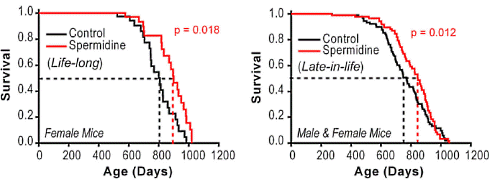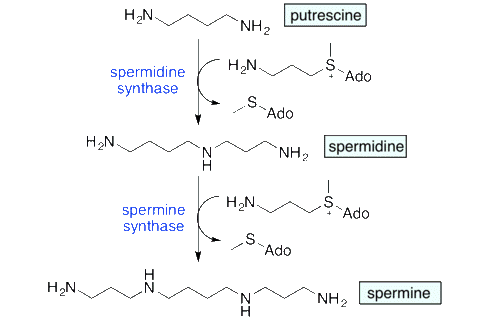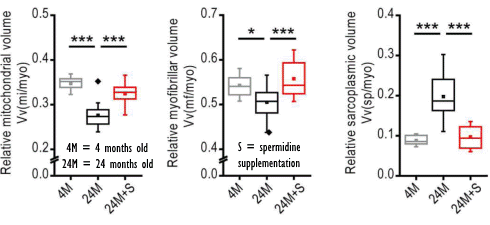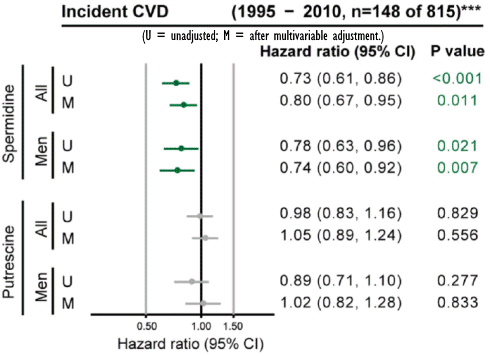Spermidine is a life extender | Animal study & some epidemiology
Yesterday we wrote about spermidine, a longevity supplement that keeps heart cells young. In 2016, Austrian molecular scientists published an animal study in which spermidine supplementation extends the lifespan of mice. Based on their own epidemiological research, the Austrians suspect that spermidine might also work in humans.Animal study
The researchers gave a group of mice a dose of spermidine through their drinking water every day from the moment they were 4 months old for the rest of their lives. If the mice had been adult humans, they would have been given roughly 60-90 milligrams of spermidine daily.
A control group did not receive active substances.
The researchers then looked at how long the animals could live.
Spermidine supplementation increased lifespan [bottom left]. Spermidine also turned out to be a life extender, even if the supplementation did not start until the 18th month of life [bottom right].
[FONT="]
[/FONT]


[FONT="]
[/FONT]
The body makes spermidine from putrescine [which is a metabolite of ornithine]. The body converts spermidine into spermine. You can see this above.The researchers repeated their experiments with putrescine and spermine, but those experiments were not very successful. Putrescine had no life-prolonging effect, spermine did - but not as convincingly as spermidine. [Figuur]
Mechanism
Spermidine supplementation slowed the mice's cardiovascular aging, the researchers found. The ability of the heart to pump blood remained intact for longer through the supplementation. And that had everything to do with the amount of mitochondria in the heart cells. In the old rats, it was larger when the animals were given spermidine.
[FONT="]
[/FONT]

[FONT="]
[/FONT]
The researchers also conducted a series of animal experiments with mice with a defective ATG5 gene. This gene plays a key role in clearing up processes in cells [autophagy]. Since all of the positive effects of spermidine were absent in those knockout mice, the researchers think spermidine helps keep tissues young by forcing cells to autophagy.Epidemiological study
Because the researchers wanted to know whether the beautiful results of their animal studies could also apply to humans, they also conducted a small epidemiological study. For this they used the data of 815 participants in the Bruneck Study, who had been followed from 1995 to 2010.
The researchers were able to find out the participants' dietary intake of spermidine and linked this to the incidence of cardiovascular disease.
And yes. The risk of cardiovascular disease incidents was lower in the study participants who consumed a relatively large amount of spermidine.
[FONT="]
[/FONT]

[FONT="]
[/FONT]
Spermidine increased the concentration of the anti-aging enzyme SIRT1 in the heart cells and activated signaling molecules such as PGC-1-alpha and TFAM. They are involved in the production of mitochondria.
Conclusion
"In summary, spermidine intake reduces cardiovascular pathologies, including hypertension and cardiac dysfunction associated with heart failure", summarize the researchers.
"In the aging population, the incidence and prevalence of heart failure are increasing in association with comorbidities such as obesity, diabetes and renal abnormalities. Our study paves the way for prospective clinical trials to evaluate the potential cardiovascular- and other health-promoting effects of spermidine-enriched diets."
Hm.
More coming soon.
Source:
Nat Med. 2016 Dec;22(12):1428-38.

|
The researchers gave a group of mice a dose of spermidine through their drinking water every day from the moment they were 4 months old for the rest of their lives. If the mice had been adult humans, they would have been given roughly 60-90 milligrams of spermidine daily.
A control group did not receive active substances.
The researchers then looked at how long the animals could live.
Spermidine supplementation increased lifespan [bottom left]. Spermidine also turned out to be a life extender, even if the supplementation did not start until the 18th month of life [bottom right].
[FONT="]
[/FONT]


[FONT="]
[/FONT]
Mechanism
Spermidine supplementation slowed the mice's cardiovascular aging, the researchers found. The ability of the heart to pump blood remained intact for longer through the supplementation. And that had everything to do with the amount of mitochondria in the heart cells. In the old rats, it was larger when the animals were given spermidine.
[FONT="]
[/FONT]

[FONT="]
[/FONT]
Because the researchers wanted to know whether the beautiful results of their animal studies could also apply to humans, they also conducted a small epidemiological study. For this they used the data of 815 participants in the Bruneck Study, who had been followed from 1995 to 2010.
The researchers were able to find out the participants' dietary intake of spermidine and linked this to the incidence of cardiovascular disease.
And yes. The risk of cardiovascular disease incidents was lower in the study participants who consumed a relatively large amount of spermidine.
[FONT="]
[/FONT]

[FONT="]
[/FONT]
Spermidine increased the concentration of the anti-aging enzyme SIRT1 in the heart cells and activated signaling molecules such as PGC-1-alpha and TFAM. They are involved in the production of mitochondria.
Conclusion
"In summary, spermidine intake reduces cardiovascular pathologies, including hypertension and cardiac dysfunction associated with heart failure", summarize the researchers.
"In the aging population, the incidence and prevalence of heart failure are increasing in association with comorbidities such as obesity, diabetes and renal abnormalities. Our study paves the way for prospective clinical trials to evaluate the potential cardiovascular- and other health-promoting effects of spermidine-enriched diets."
Hm.
More coming soon.
Source:
Nat Med. 2016 Dec;22(12):1428-38.


